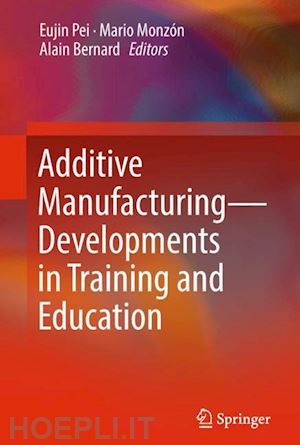
Questo prodotto usufruisce delle SPEDIZIONI GRATIS
selezionando l'opzione Corriere Veloce in fase di ordine.
Pagabile anche con Carta della cultura giovani e del merito, 18App Bonus Cultura e Carta del Docente
This book provides an overview of training and teaching methods, as well as education strategies, for Additive Manufacturing (AM) and its application in different business sectors. It presents real-world applications and case studies to demonstrate the key practical and theoretical fundamentals of AM training, written by international experts from the field.
Additive Manufacturing is a rapidly developing technology, and having a well-trained workforce is essential. Accordingly, readers are introduced to new training approaches and recent breakthroughs that can facilitate and accelerate the design, application and implementation of AM.
The book’s contributors discuss many topics to provide readers a fundamental grasp of AM, including:
· collaboration among educational bodies, and between industry and governments;
· strategies for implementing AM training;· new teaching methods;
· training programs that provide alternative employment choices;
· the need for certification by professional bodies; and
· promoting awareness of AM in society.
This book offers an excellent source of information for researchers and industrial engineers who are interested in expanding their AM expertise, and learning how to implement it. It will also be of interest to readers who want to learn about the practicalities of adopting training and teaching for AM.
Dr Eujin Pei is the Programme Director for the Product Design and Product Design Engineering courses at Brunel University London. He is a Chartered Engineer (CEng) and a Chartered Technological Product Designer (CTPD) with the Institution of Engineering Designers. He worked as a Product Designer possessing considerable expertise in leading and managing industrial collaborative projects. He is the Convenor for the International Organization for Standardization (ISO) TC261/WG4 committee that is responsible for Data Transfer and Design Standards for Additive Manufacturing, and Chair of the British Standards Institute AMT/8 committee for Additive Manufacturing. He is the Managing Editor for the Progress in Additive Manufacturing Journal, and Associate Editor for the Assembly Automation Journal and the Journal of Intelligent Manufacturing. He is also an editorial board member of the Rapid Prototyping Journal.
Professor Mario D. Monzón Verona is a Doctor in Industrial Engineering and full Professor in Mechanical Engineering department of Las Palmas de Gran Canaria University. He has been working in the academic field of Manufacturing processes since 1989. He is in charge of the research group “Advanced and Integrated manufacturing” which main research activities are focused on polymer processing, additive manufacturing/rapid tooling (electroforming), natural fibres applied to composites and technical textiles, biomaterials for additive manufacturing and micro-manufacturing.
Professor Alain Bernard graduated in 1982, PhD in 1989, was associate-Professor, from 1990 to 1996 in Centrale Paris. From Sept. 1996 to Oct. 2001, he was Professor in CRAN, Nancy I, in the “Integrated Design and Manufacturing” team. Since 0ct. 2001, he has been Professor at Centrale Nantes and Dean for Research from 2007 to 2012. He is a researcher in LS2N laboratory (UMR CNRS 6004) leading the “Systems Engineering –Products-Processes-Performances-” team. His research topics are KM, PLM, information system modeling, interoperability, enterprise modeling, systems performance assessment, virtual engineering and additive manufacturing. He supervised 30 PhD students and has published more than 250 papers in refereed international journals, books and conferences. He is the vice-President of AFPR (French Association on Rapid prototyping and Additive Manufacturing), vice-chairman of WG5.1 of IFIP (Global Product Development for the whole product lifecycle) and member of the CIRP Council. He is also scientific adviser on Engineering Sciences at the French Ministry for Higher Education and Research.











Il sito utilizza cookie ed altri strumenti di tracciamento che raccolgono informazioni dal dispositivo dell’utente. Oltre ai cookie tecnici ed analitici aggregati, strettamente necessari per il funzionamento di questo sito web, previo consenso dell’utente possono essere installati cookie di profilazione e marketing e cookie dei social media. Cliccando su “Accetto tutti i cookie” saranno attivate tutte le categorie di cookie. Per accettare solo deterninate categorie di cookie, cliccare invece su “Impostazioni cookie”. Chiudendo il banner o continuando a navigare saranno installati solo cookie tecnici. Per maggiori dettagli, consultare la Cookie Policy.